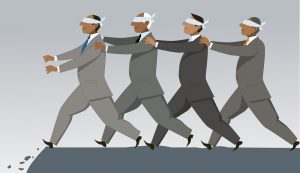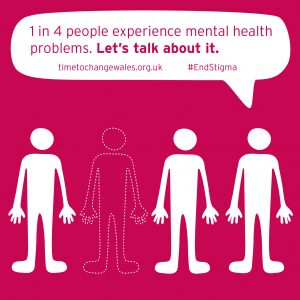 Wednesday 10th October marked World Mental Health Day. And according to the NHS, one in four people in the UK are likely to suffer from mental health issues over the course of their life. In London alone, where half a million people are employed, loneliness is becoming an increasingly damaging problem, with GPs calling it an epidemic “affecting all ages”. More than a social issue, a recent government report found poor wellbeing is costing UK employers up to £42 billion annually. Despite this, discussing mental health and wellbeing remains taboo in the workplace.
Wednesday 10th October marked World Mental Health Day. And according to the NHS, one in four people in the UK are likely to suffer from mental health issues over the course of their life. In London alone, where half a million people are employed, loneliness is becoming an increasingly damaging problem, with GPs calling it an epidemic “affecting all ages”. More than a social issue, a recent government report found poor wellbeing is costing UK employers up to £42 billion annually. Despite this, discussing mental health and wellbeing remains taboo in the workplace.
So, how can we break the silence?
Understanding wellbeing
 Firstly, business leaders must establish why they want to tackle wellbeing in the workplace, asking honestly whether this is more than a box-ticking exercise. Many companies already offer a raft of “perks”, from open bars on a Friday to in-house yoga. In principle, this is fantastic – who wouldn’t want to work for a company who appears, on the surface, to advocate for a good work-life balance? In practice however, these perks can fall flat – an early finish is only a perk if your workload and employer allows you to take advantage of it.
Firstly, business leaders must establish why they want to tackle wellbeing in the workplace, asking honestly whether this is more than a box-ticking exercise. Many companies already offer a raft of “perks”, from open bars on a Friday to in-house yoga. In principle, this is fantastic – who wouldn’t want to work for a company who appears, on the surface, to advocate for a good work-life balance? In practice however, these perks can fall flat – an early finish is only a perk if your workload and employer allows you to take advantage of it.
Don’t be a lemming
 Employers must take the time to understand what will and won’t work for their business – if an early finish isn’t feasible because of international clients, for example, would a work from home policy one day a week be workable? You also have to consider what will work for the individual; flexibility is personal and managers must understand the nuances of personal need in order to invest holistically in the growth of their employees.
Employers must take the time to understand what will and won’t work for their business – if an early finish isn’t feasible because of international clients, for example, would a work from home policy one day a week be workable? You also have to consider what will work for the individual; flexibility is personal and managers must understand the nuances of personal need in order to invest holistically in the growth of their employees.
Talk about it
 One of the best ways to break any taboo is to bring it into the open. Leaders are now standing up in front of their employees more regularly to talk about health and mental wellbeing alongside business performance.
One of the best ways to break any taboo is to bring it into the open. Leaders are now standing up in front of their employees more regularly to talk about health and mental wellbeing alongside business performance.
Making these links between health and happiness and productivity is important; if you want a culture of high performance, you not only have to invest in your people’s craft skill but also in their wellbeing as a whole. Sharing these types of stories and experiences creates role models across the business and works to lessen the stigma attached to mental health in the workplace.
In fact, from January 2019 we will be partnering with Sanctus, a mental health start-up, to provide coaching to all employees. In particular, it will give staff a space to work on their mental fitness – Sanctus will be providing us with a coach who will be onsite every fortnight, giving 1:1 safe, confidential and impartial space for staff to talk about anything they want.
Employees as consumers
 Across industries, we’re increasingly seeing the consumerisation of the workplace; just as people expect personalised experiences from brands in their private lives, so too are they demanding this of employers. Delivering against this means understanding your employees on a micro and macro level in order to meet their unique needs. As an agency with a younger workforce, for example, we brought wellbeing to life in a “festival” setting, allowing our employees to curate their own experience in a format that felt familiar. That said, don’t turn to one-off gestures to tick the wellbeing box – whilst one event can act as a catalyst, it should embody an ethos that is present year-round.
Across industries, we’re increasingly seeing the consumerisation of the workplace; just as people expect personalised experiences from brands in their private lives, so too are they demanding this of employers. Delivering against this means understanding your employees on a micro and macro level in order to meet their unique needs. As an agency with a younger workforce, for example, we brought wellbeing to life in a “festival” setting, allowing our employees to curate their own experience in a format that felt familiar. That said, don’t turn to one-off gestures to tick the wellbeing box – whilst one event can act as a catalyst, it should embody an ethos that is present year-round.
Get some space
 Crucially, delivering against the needs of individual employees requires the space to figure out how to do so. When I wanted to retrain as a nutritionist, Mindshare helped me find this space; both in my calendar, building in half a day into my week to see nutrition clients, as well as mentally, to retrain and grow my passion into expertise. When tackling mental health and wellbeing, this space is crucial – and will allow us to avoid one-size-fits-all solutions.
Crucially, delivering against the needs of individual employees requires the space to figure out how to do so. When I wanted to retrain as a nutritionist, Mindshare helped me find this space; both in my calendar, building in half a day into my week to see nutrition clients, as well as mentally, to retrain and grow my passion into expertise. When tackling mental health and wellbeing, this space is crucial – and will allow us to avoid one-size-fits-all solutions.
Article by Jo Lyall, Managing Director, Mindshare UK.
 About Jo:
About Jo:
Jo is the Managing Director of Mindshare. She is responsible for growth and new product development as well as for creating client satisfaction and maintaining a happy and high-performing workforce.
Over a 20-year career in media, she has worked in almost every area of the business. Spending the first 10 years working in digital where, ultimately, she became Head of Digital and launched Mindshare Social. Over the next 8 years she went on to set up and lead Invention, our content and partnership team. Following this she ran the Planning department as Chief Planning Officer.
She built the first generation of planners with the ability to blend digital, offline and social planning to create effective and innovative solutions to our clients’ marketing challenges.
Source: Mindshare

You must be logged in to post a comment Login